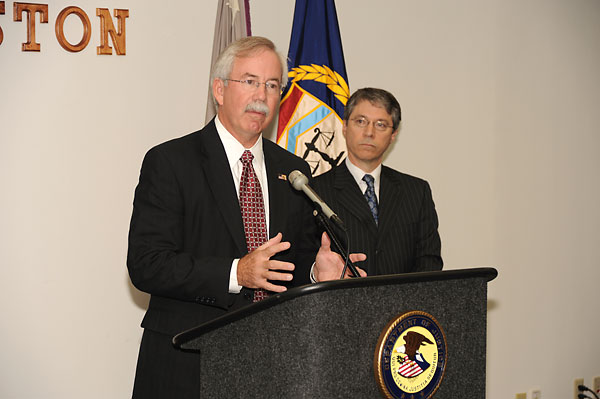Ken Melson, the embattled acting head of the Bureau of Alcohol, Tobacco, Firearms and Explosives (ATF), told Congressional investigators that he became “sick to his stomach” after learning details of the troubled anti-gun-trafficking program called Fast and Furious.
Melson on Tuesday testified for the first time before investigators for the House Oversight and Government Reform and Senate Judiciary Committees, which have been pummeling the administration with questions about controversial tactics to stop the flow of weapons from the U.S. to Mexican drug cartels. Melson, who appeared in a private meeting before the panel with his own personal counsel rather than Justice Department attorneys, said DOJ officials had prevented him from cooperating with Congress’ investigations thus far.
The two panels have spent months investigating ATF’s strategy of letting guns “walk” by instructing cooperating gun dealers to sell to people they suspected were straw purchasers in the hopes of building cases against major arms smugglers. Two of those guns were eventually found at the scene of the murder of American Border Patrol agent Brian Terry.
After interviewing Melson extensively Tuesday, Sen. Chuck Grassley (R-IA), the ranking member of the Judiciary Committee, and Rep. Darrell Issa (R-CA), who chairs the House Oversight Committee, wrote a letter to Attorney General Eric Holder, expressing deep concerns about several issues raised during Melson’s testimony. Read the full letter here.
“Acting Director Melson’s cooperation was extremely helpful to our investigation,” Grassley and Issa wrote. “He was candid in admitting mistakes that his agency made and described various ways he says that he tried to remedy the problems.”
Melson told Congressional investigators Tuesday that only after the controversy became public in the wake of Terry’s death did he review hundreds of documents related to the case including wire tap applications and investigative reports.
“By his account, he was sick to his stomach when he obtained those documents and learned the full story,” Grassley and Issa wrote in their letter to Holder.
Melson also said he told the Office of the Deputy Attorney General (ODAG) at the end of March that the Department needed to reexamine how it was responding to the requests for information from Congress, according to the letter.
More broadly, Grassley and Issa said Melson told them that the Drug Enforcement Agency, FBI and other agencies, were possibly aware or even working with people connected to Fast and Furious suspects with ATF’s knowledge.
“The evidence we have gathered raises the disturbing possibility that the Justice Department not only allowed criminals to smuggle weapons but that taxpayer dollars from other agencies may have financed those engaging in such activities,” they wrote. “While this is preliminary information, we must find out if there is any truth to it.”
Grassley and Issa also pointed to two other key assertions Melson made to investigators:
Contrary to denials by the Justice Department, Acting Director Melson acknowledged the agents had in fact witnessed transfers of weapons from straw purchasers to third parties without following the guns any further.
The ATF group executing Operation Fast and Furious had been placed under the direction of the Arizona U.S. Attorney’s office.
The pair took particular exception to the Melson’s testimony about the Justice Department’s role in obstructing Congressional investigations, noting that Melson claimed that ATF’s senior leadership would have preferred to be more cooperative with Congress much earlier in the process, but DOJ officials “directed them not to respond and took full control of replying to briefing and document requests from Congress.”
“The result is that Congress only got the parts of the story that the department wanted us to hear,” Grassley and Issa wrote. “If this account is accurate, then ATF leadership appears to have been effectively muzzled while the DOJ sent over false denials and buried its head in the sand.”
Contrary to recent press reports, Melson also told investigators he was not recently asked to resign — and Grassley and Issa stressed that it would be inappropriate to ask him to do so given his testimony and cooperation with the committees.
“Given his testimony, unless a permanent director is confirmed, it would be inappropriate for the Justice Department to take action against him that could have the effect of intimidating others who might want to provide additional information to the Committees,” they wrote. “We hope that the Department will take a much more candid and forthcoming approach in addressing these very serious matters with the Committees.”









